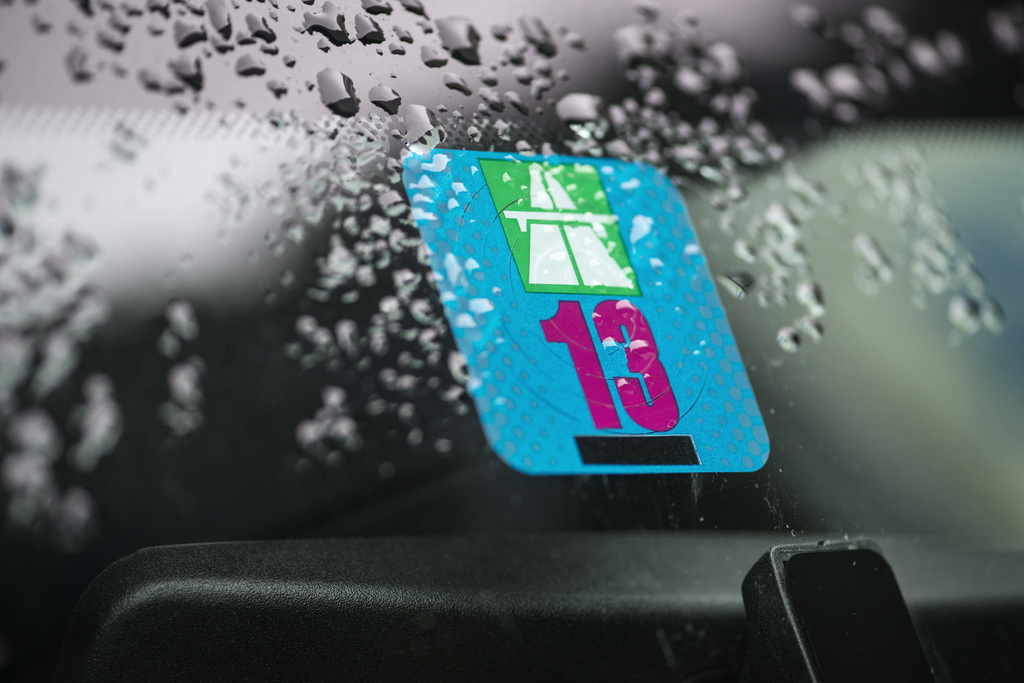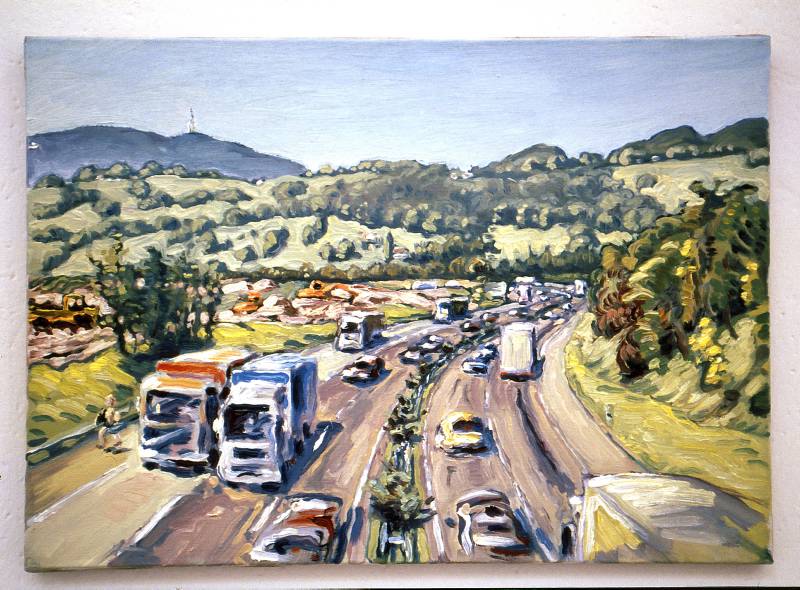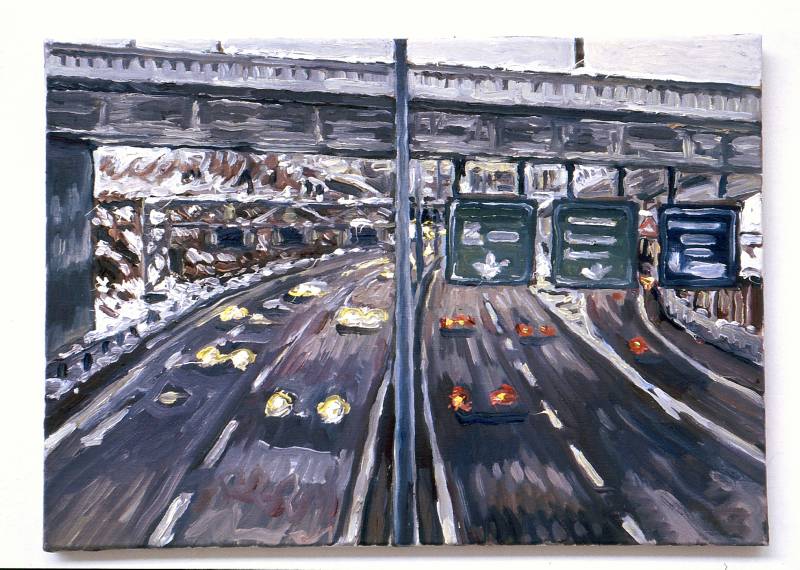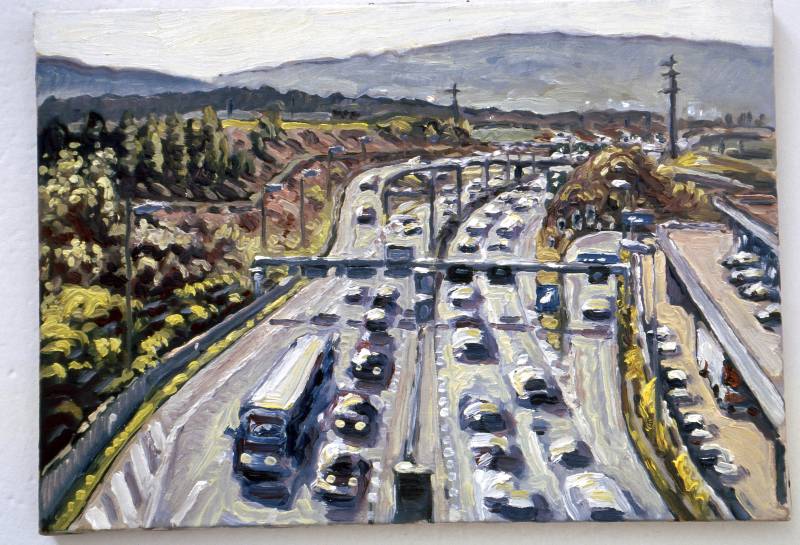Motorway tax price hike causes controversy

The cost of a Swiss motorway tax sticker could rise 150 per cent if the government and parliament have their way. But a referendum against the increase has been called for November 24, so voters will have the final word.
An outcry followed the announcement that the tax “vignette” – an annual levy required to use all Swiss motorways and dual carriageways – was to shoot up in price from CHF40 to CHF100 ($44-$110) from 2016.
Opponents complained that the increase was too high, that foreigners would be getting special treatment because they would benefit from a new short-stay vignette and that small and-medium sized companies with vehicle fleets would be at a disadvantage.
Soon, a committee against the increase was founded and 107,424 signatures were collected within just three months – only 50,000 are needed to put a proposed bill to a popular vote.
“The private citizen, the driver, is being ripped off, with nothing being given back in return,” said Nadja Pieren, a rightwing Swiss People’s Party parliamentarian and co-president of the referendum committee.
“We won’t have fewer traffic jams or better connected roads. We’ll just be paying more for roads which have already been built, which are currently funded by the cantons, and which the government is to fund in the future.”

Motives for opposition vary
Also against the move are the two largest automobile associations: the Swiss Automobile Club and the Touring Club Switzerland. They are calling for the government to overhaul its whole road financing process.
But the Transport and Environment Association’s opposition to the price hike is being driven by an entirely different motive: the environmentalist group is against more money being ploughed into road building and new main roads.
The Green Party is also against the price hike, arguing that it doesn’t want any more motorway improvements and that a specific steering tax (ecological incentive tax) would be more suitable than the present standard sticker price.
“If you drive a lot, you should pay more,” says the party. It would have agreed to a new vignette price of CHF80.
The current sticker has to be affixed to the windscreen and is often hard to remove. Traffic Minister Doris Leuthard says that the sticker could be replaced with an electronic solution “in the coming years”.
A Federal Customs Office report says that several European countries already use an electronic system. The advantages: easier use and oversight, more savings and less abuse of the system.
The customs office estimates that CHF30 million comes every year from financial penalties due to forgeries and multiple use of motorway tax stickers.
Good investment, say supporters
Among those pushing for the price hike are the government, a majority of parliament, the Swiss Conference of Directors of Public Works, Planning and Environmental Protection, the Swiss Cities Association and Swiss hoteliers. A centre-right committee has also come out in favour of the CHF100 vignette price.
“Switzerland needs a good, safe infrastructure,” said senior Christian Democratic parliamentarian Christophe Darbellay and co-president of this committee.
“For years we have invested far too little and now there’s a backlog. This infrastructure is just so valuable to us.”
No other country in Europe has proportionally so many bridges and tunnels to maintain and build, he pointed out. “This justifies the price in my view, it’s really money well-invested.”

Safer cities?
Transport Minister Doris Leuthard told Swiss public radio at the launch of the government’s voting campaign that “people will benefit from the higher-priced vignette”.
She pointed out that roads will become safer and cities less noisy as a result of the price increase and new bypasses which have also been given the green light.
But Pieren does not agree. “Increasing the price of the sticker, which does not solve any the problems we have on roads, is completely ripping off the people and is another hidden tax to pay,” she stated.
“Drivers shouldn’t be milked for all their worth simply to counter the state’s financial problems in some areas. We are totally against this and say no way to this vignette price hike. The limit has been reached.”

Bigger burden
Pieren also objects to the new two-month temporary vignette. “It’s unfair that foreigners only have to pay CHF40 and that the Swiss, who don’t just need it for two months, but for twelve, albeit not very often, have to pay 150 per cent more.”
But Darbellay finds it a good solution because it means foreign road users will also have to pay their share. “If we only sought to find a solution via taxes, the burden would fall on the Swiss and Swiss firms.”
Darbellay pointed out that those opposing the price hike have also always complained that there was too much focus on public transport in transportation policy.

More
Referendum
Breaking a taboo
“Under the former transport minister Moritz Leuenberger, we were not really allowed to mention road building. It was a taboo. Now we are able to tackle these things and we really need to do so,” said Darbellay.
But now that there is potentially more money for roads, there is opposition, he added.
“There are some important conditions to be met if we want Switzerland’s success to continue – and good infrastructure is part of that.”
The Federal Roads Office, which comes under the transport ministry, is responsible for the so-called national roads, for which the motorway tax sticker (“vignette”) is required.
It is obligatory for all drivers of motor vehicles and trailers, whether they use the national road network once a year or every day.
It was introduced in 1985 at a cost of CHF30 and this was increased to CHF40 in 1995, a level where it has remained ever since.
The sticker is affixed to the windscreen and the funds from its sale are used by the government for the building, operation and upkeep of the network of nationanl roads.
The rise in price to CHF100 comes at the same time that the government has announced that it proposes to incorporate into the national network a total of 376 kilometres of road currently funded by the cantons. This would reduce the pressure on cities and agglomerations, it is argued.
Each cantonal capital would then be linked to the national road network.
In addition, the road upgrades of national importance usually done by the cantons will be taken over by the federal government. The government estimates that this extra work will cost CHF305 million.
Tourists will be able to buy a short-stay sticker for CHF40, which is valid for two months.
The European Union says that is talking with Switzerland about introducing an even shorter-stay vignette valid for a week or ten days.
Other countries which have a motorway tax sticker allow people to buy a cheaper, short-term vignette if they only use their motorways for a short time
(Translated from German by Isobel Leybold-Johnson)

In compliance with the JTI standards
More: SWI swissinfo.ch certified by the Journalism Trust Initiative











You can find an overview of ongoing debates with our journalists here . Please join us!
If you want to start a conversation about a topic raised in this article or want to report factual errors, email us at english@swissinfo.ch.